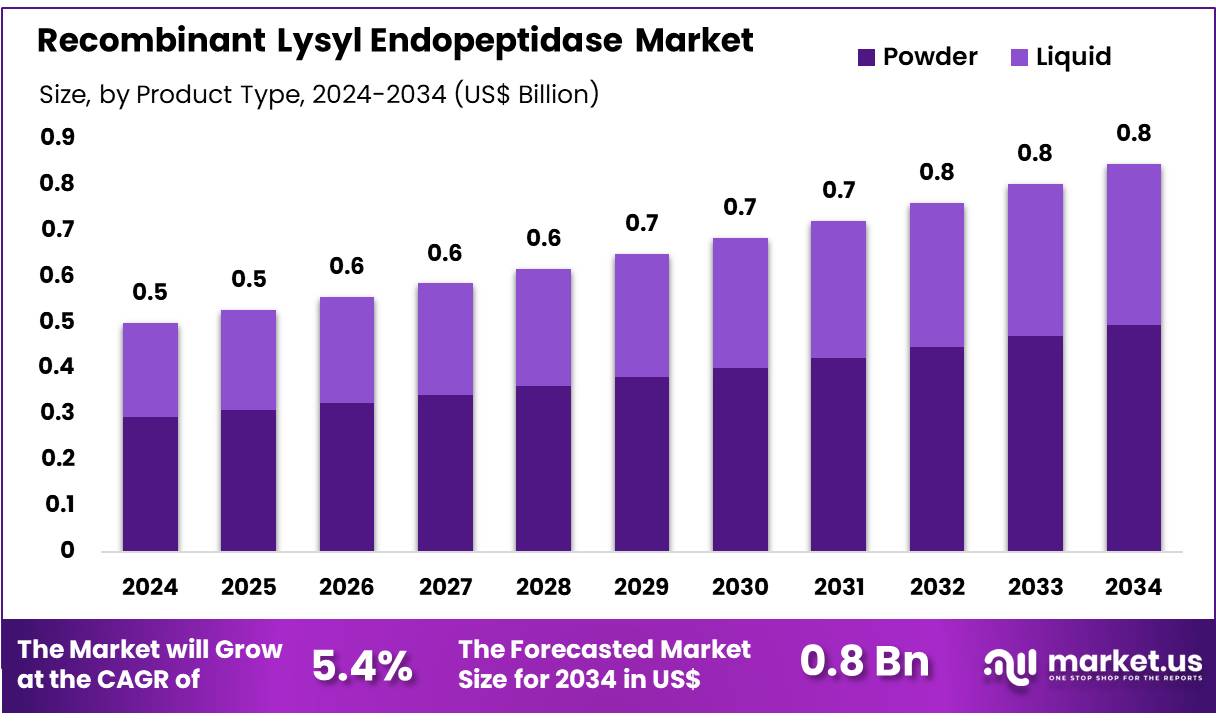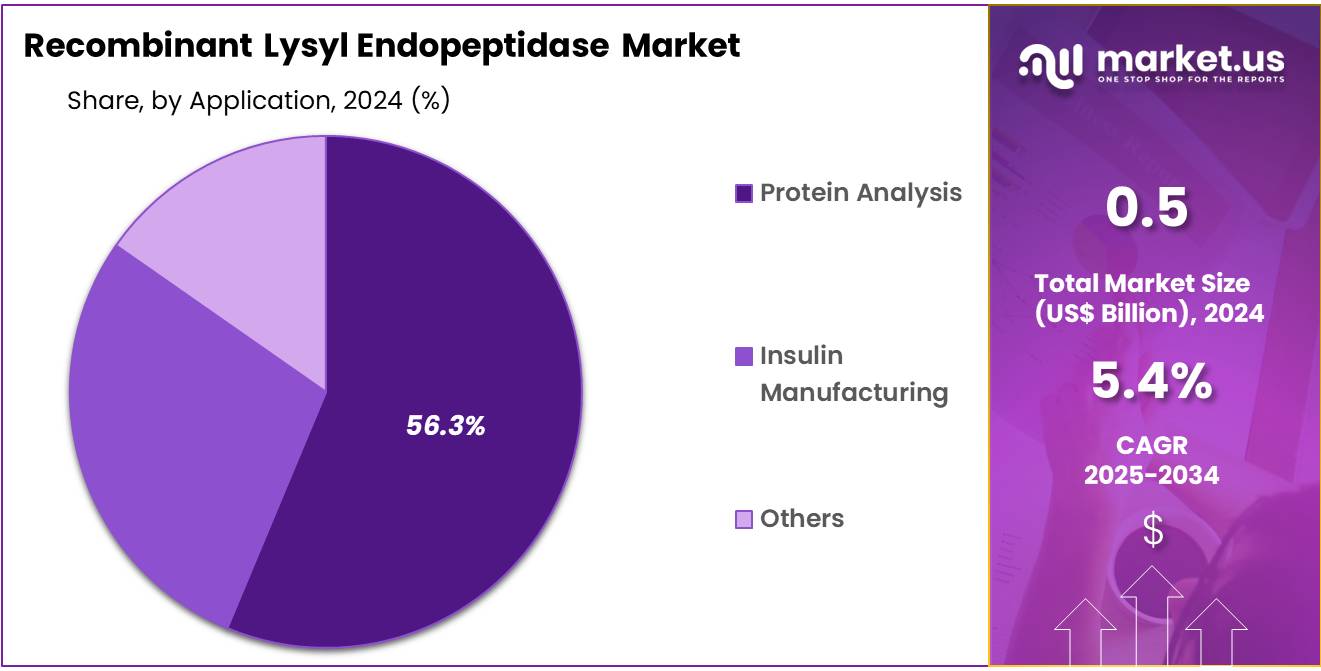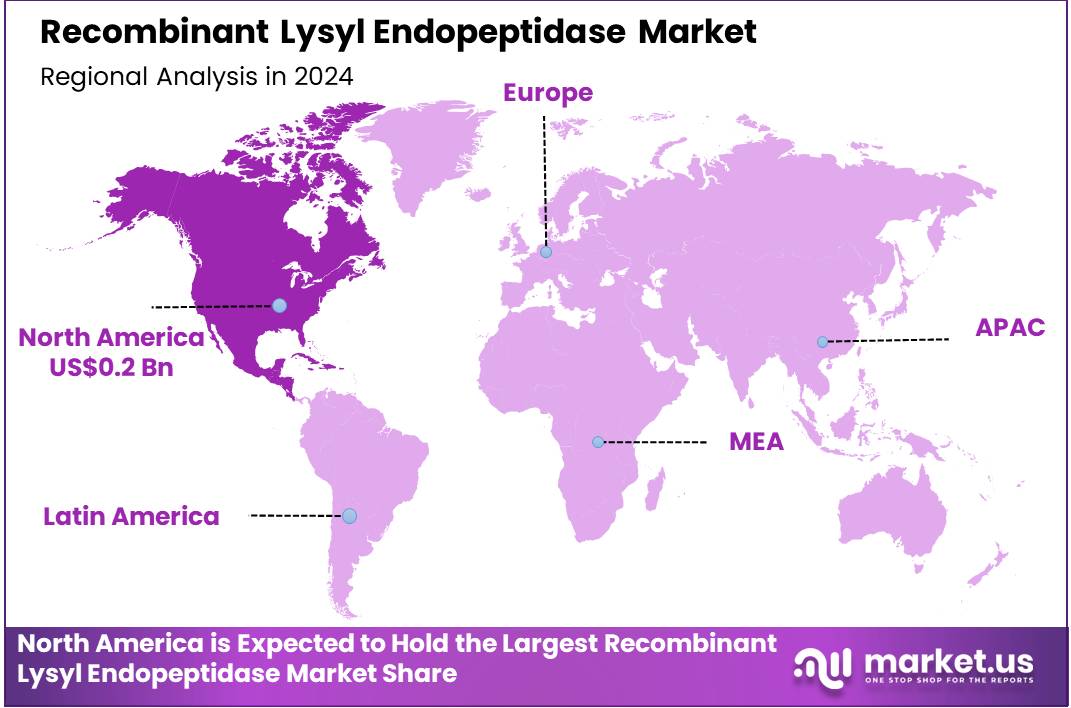Global Recombinant Lysyl Endopeptidase Market By Product Type (Powder and Liquid), By Application (Protein Analysis, Insulin Manufacturing, and Others), Region and Companies – Industry Segment Outlook, Market Assessment, Competition Scenario, Trends and Forecast 2025-2034
- Published date: May 2025
- Report ID: 147975
- Number of Pages: 339
- Format:
-
keyboard_arrow_up
Quick Navigation
Report Overview
Global Recombinant Lysyl Endopeptidase Market size is expected to be worth around US$ 0.8 billion by 2034 from US$ 0.5 billion in 2024, growing at a CAGR of 5.4% during the forecast period 2025 to 2034. In 2024, North America led the market, achieving over 38.5% share with a revenue of US$ 0.2 Billion.
Increasing advancements in biotechnological research and development are driving the growth of the recombinant lysyl endopeptidase market. This enzyme plays a critical role in protein engineering and peptide synthesis, offering applications in pharmaceutical development, diagnostics, and therapeutic formulations. Rising demand for targeted therapies, particularly in the treatment of genetic disorders and cancer, fuels the need for more efficient and precise biocatalysts.

Recombinant lysyl endopeptidase enables the production of high-quality peptides, enhancing drug development processes. Recent trends show an uptick in biomanufacturing and biofoundry technologies, with significant investments being made to improve manufacturing scalability and cost-efficiency. In September 2024, the Biotechnology Research Innovation and Entrepreneurship Development (Bio-RIDE) scheme was approved by the Union Cabinet, with a total outlay of ₹9,197 crore (approximately US$1.1 billion) for the 15th Finance Commission period (2021–2026).
This initiative aims to support the expansion of biomanufacturing capabilities, further contributing to the growth of recombinant enzymes like lysyl endopeptidase in drug discovery and biotherapeutic applications. As demand for advanced biologics continues to rise, opportunities for innovation and market expansion in enzyme production and applications will grow substantially.
Key Takeaways
- In 2024, the market for recombinant lysyl endopeptidase generated a revenue of US$ 0.5 billion, with a CAGR of 5.4%, and is expected to reach US$ 0.8 billion by the year 2033.
- The product type segment is divided into powder and liquid, with powder taking the lead in 2024 with a market share of 58.6%.
- Considering application, the market is divided into protein analysis, insulin manufacturing, and others. Among these, protein analysis held a significant share of 46.3%.
- North America led the market by securing a market share of 38.5% in 2024.
Product Type Analysis
The powder segment led in 2024, claiming a market share of 58.6% owing to its growing application in various industrial processes. Powder formulations of recombinant lysyl endopeptidase are projected to be highly preferred due to their stability, ease of storage, and transportation advantages. As the demand for enzymatic treatments in fields such as protein purification and pharmaceutical manufacturing increases, the powder form of recombinant lysyl endopeptidase is likely to see heightened adoption.
Additionally, the ease of integration into different biochemical processes, particularly in research and drug production, is expected to boost its usage. The increasing trend toward large-scale applications and the need for convenient handling are anticipated to further propel growth in the powder segment.
Application Analysis
The protein analysis held a significant share of 56.3% as demand for precise and efficient protease enzymes continues to rise. Recombinant lysyl endopeptidase is increasingly used in protein analysis applications, including protein cleavage, sequencing, and structural studies. The segment’s growth is expected to be driven by the increasing need for high-quality protein analysis in biotechnology, pharmaceuticals, and research laboratories.
This enzyme is highly effective in cleaving proteins at specific sites, making it a crucial tool for protein structure elucidation. As protein-based drug development and personalized medicine continue to evolve, the demand for recombinant lysyl endopeptidase in protein analysis is likely to experience significant growth.

Key Market Segments
Product Type
- Powder
- Liquid
Application
- Protein Analysis
- Insulin Manufacturing
- Others
Drivers
Rising Demand in Proteomics Research is Driving the Market
The increasing emphasis on proteomics research is a primary driver for the recombinant lysyl endopeptidase market. Proteomics, the large-scale study of proteins, is crucial for understanding biological processes, disease mechanisms, and drug development. Lysyl endopeptidase, also known as Lys-C, is a highly specific protease essential for protein digestion in mass spectrometry.
The National Institutes of Health (NIH) is a significant supporter of proteomics research, as evidenced by a US$50.3 million grant awarded in 2023 to establish the Multi-Omics for Health and Disease Consortium, which includes proteomics studies. This highlights the importance of protein analysis in advancing human health research.
Furthermore, the increasing prevalence of chronic and infectious diseases, as noted by the World Health Organization (WHO), which predicts a 77% surge in new cancer cases by 2050, compared to 2022, necessitates advanced proteomics for diagnostics and drug discovery, thereby driving the demand for enzymes like recombinant Lys-C.
Restraints
High Production Costs and Regulatory Hurdles are Restraining the Market
Despite the growing demand, the high production costs associated with recombinant lysyl endopeptidase pose a significant restraint on market expansion. The complex purification processes and the cost of raw materials contribute to the overall manufacturing expenses. The NIH has acknowledged the challenges in accessing advanced proteomics resources, particularly for researchers in underfunded areas, indicating the cost sensitivity in this field.
Additionally, navigating regulatory hurdles in different regions can impede market access and slow down the adoption of newer products. Lengthy approval processes, especially in regions with stringent standards for laboratory chemicals, can create barriers. These factors can limit the widespread use of this crucial enzyme, particularly in research settings with budget limitations.
Opportunities
Expanding Applications in Clinical Proteomics are Creating Growth Opportunities
The expanding applications of proteomics in clinical diagnostics and personalized medicine are creating significant growth opportunities for the recombinant lysyl endopeptidase market. The demand for proteomics tools in clinical settings has seen a notable increase, driven by the need for precise diagnostic tools capable of identifying biomarkers for various diseases.
Research published in Nature Medicine in August 2024 describes the development of a proteomic aging clock using plasma proteins to predict the risk of age-related diseases, showcasing the growing utility of proteomics in clinical applications. The NIH continues to fund initiatives like the Clinical Proteomic Tumor Analysis Consortium (CPTAC), aimed at accelerating cancer research through proteomics and genomics, further underscoring the importance of protein analysis in clinical advancements and the potential for increased demand for enzymes like recombinant Lys-C.
Impact of Macroeconomic / Geopolitical Factors
Macroeconomic factors significantly mold the recombinant lysyl endopeptidase market through research funding fluctuations tied to economic cycles, production cost variations due to inflation, and the impact of currency exchange rates on international trade of raw materials and finished products. Conversely, economic growth and supportive government policies often spur investment and demand within the life sciences.
Geopolitical factors introduce complexities via trade disruptions affecting supply chains, political instability hindering research collaborations and market access, and stricter biosecurity regulations influencing production and distribution. However, international scientific partnerships can broaden proteomics applications, thereby increasing the enzyme’s demand, while global health crises may redirect research priorities and funding. Despite these varied influences, the fundamental role of this enzyme in advancing biological understanding and pharmaceutical innovation underpins its sustained market relevance.
Current US tariff policies have a multifaceted impact on the market. Increased tariffs on imported laboratory equipment and chemicals, which are essential for the production and application of recombinant lysyl endopeptidase, elevate the operational costs for both manufacturers and end-users in the US. This rise in expenses could potentially slow down research activities and limit the adoption of advanced proteomic techniques that rely on this enzyme.
For US-based manufacturers, tariffs on imported raw materials or intermediate products might increase their production costs, making them less competitive. Conversely, tariffs on recombinant lysyl endopeptidase produced in other countries could offer a competitive advantage to domestic manufacturers, potentially encouraging local production and innovation. However, retaliatory tariffs imposed by other nations on US exports could negatively affect the international sales of US-made enzymes and related technologies.
The Biotechnology Innovation Organization (BIO) reported in April 2025 that tariffs on imports from the European Union and Canada could increase manufacturing costs for 94% and 82% of US biotech firms, respectively, highlighting the significant concern within the sector. Despite these potential challenges, the critical role of recombinant lysyl endopeptidase in fundamental research and pharmaceutical development suggests that demand within the US market will likely persist, albeit possibly at adjusted price points and supply chain configurations.
Latest Trends
Development of Enhanced Enzyme Formulations is a Recent Trend
A notable recent trend in the recombinant lysyl endopeptidase market is the development and increasing adoption of enhanced enzyme formulations. Manufacturers are focusing on producing Lys-C with higher purity, stability, and activity to meet the stringent requirements of advanced proteomic analyses. For instance, mass spectrometry-grade Lys-C is specifically designed to minimize background noise and ensure accurate and reproducible results in sensitive applications.
Companies like Abcam offer recombinant Lysyl endopeptidase protein with high purity (>85% by SDS-PAGE), demonstrating the industry’s focus on quality. These advancements in enzyme formulation are driven by the need for more reliable and efficient protein digestion methods in cutting-edge research and clinical applications.
Regional Analysis
North America is leading the Recombinant Lysyl Endopeptidase Market
North America dominated the market with the highest revenue share of 38.5% owing to the increasing demand for precise protein analysis within the biopharmaceutical sector. The National Institutes of Health (NIH) in the US has reported a substantial increase in grants related to proteomics research, which often necessitates the use of highly specific enzymes for protein characterization.
Furthermore, the Canadian Institutes of Health Research (CIHR) has also highlighted a growing emphasis on advanced protein sequencing techniques in funded research projects across Canada. This heightened focus on detailed protein analysis by government-backed research initiatives directly contributes to the increased consumption of recombinant lysyl endopeptidase.
The regulatory support for the development of biologics by agencies like the Food and Drug Administration (FDA) in the US and Health Canada further drives the need for sophisticated analytical tools in protein characterization, thereby boosting the market for this enzyme.
The Asia Pacific region is expected to experience the highest CAGR during the forecast period
Asia Pacific is expected to grow with the fastest CAGR owing to the escalating investments in biotechnology and pharmaceutical research supported by government initiatives. The Chinese Ministry of Science and Technology has outlined significant funding increases for projects focused on protein engineering and drug development, areas where precise enzymatic tools are crucial.
Similarly, the Indian Department of Biotechnology has emphasized the growth of the biopharmaceutical industry through various funding schemes and infrastructure development, leading to greater demand for advanced analytical enzymes.
Government support for the development of local biopharmaceutical manufacturing capabilities across the Asia Pacific region is also anticipated to increase the need for high-quality protein analysis, subsequently driving the consumption of recombinant lysyl endopeptidase in research and quality control processes.

Key Regions and Countries
North America
- US
- Canada
Europe
- Germany
- France
- The UK
- Spain
- Italy
- Russia
- Netherland
- Rest of Europe
Asia Pacific
- China
- Japan
- South Korea
- India
- Australia
- New Zealand
- Singapore
- Thailand
- Vietnam
- Rest of APAC
Latin America
- Brazil
- Mexico
- Rest of Latin America
Middle East & Africa
- South Africa
- Saudi Arabia
- UAE
- Rest of MEA
Key Players Analysis
Key players in the recombinant lysyl endopeptidase market drive growth through strategic investments in research and development, expanding their product portfolios, and enhancing global distribution networks. They focus on developing advanced recombinant enzymes with high specificity and activity to support applications in proteomics, peptide mapping, and biopharmaceutical production.
Collaborations with academic institutions, research organizations, and healthcare providers facilitate the integration of new technologies and broaden market access. Additionally, targeting emerging markets with increasing research activities and healthcare infrastructure presents significant growth opportunities.
Gene-Biocon, headquartered in Zhuhai, China, is a leading manufacturer of high-quality recombinant enzymes and biopharmaceutical products. The company offers a comprehensive range of recombinant enzymes, including lysyl endopeptidase, produced through recombinant DNA technology in E. coli and Pichia pastoris systems. Gene-Biocon’s products are widely used in proteomics, peptide synthesis, and biopharmaceutical manufacturing. With a strong commitment to innovation and quality, the company continues to expand its presence in the global market through strategic partnerships and technological advancements.
Top Key Players
- MyBioSource
- Gene Biocon
- Cusabio
- Biomatik
- Biomall
- Alpha Laboratories
- ACRO Biosystems
- Abcam
Recent Developments
- In October 2023, researchers from East China University of Science and Technology developed a new strategy for the recombinant expression and purification of lysyl endopeptidase, achieving high yields and activity of the protein.
- In August 2024, researchers from Fudan University investigated microthrombosis regulation in type 2 diabetes by analyzing platelets with 4D label-free proteomics. They used recombinant lysyl endopeptidase in platelet preparation, revealing lysosomes as a potential therapeutic target for antithrombotic treatment in type 2 diabetes.
Report Scope
Report Features Description Market Value (2024) US$ 0.5 billion Forecast Revenue (2034) US$ 0.8 billion CAGR (2025-2034) 5.4% Base Year for Estimation 2024 Historic Period 2020-2023 Forecast Period 2025-2034 Report Coverage Revenue Forecast, Market Dynamics, COVID-19 Impact, Competitive Landscape, Recent Developments Segments Covered By Product Type (Powder and Liquid), By Application (Protein Analysis, Insulin Manufacturing, and Others) Regional Analysis North America – US, Canada; Europe – Germany, France, The UK, Spain, Italy, Russia, Netherlands, Rest of Europe; Asia Pacific – China, Japan, South Korea, India, Australia, New Zealand, Singapore, Thailand, Vietnam, Rest of APAC; Latin America – Brazil, Mexico, Rest of Latin America; Middle East & Africa – South Africa, Saudi Arabia, UAE, Rest of MEA Competitive Landscape MyBioSource, Gene Biocon, Cusabio, Biomatik, Biomall, Alpha Laboratories, ACRO Biosystems, and Abcam. Customization Scope Customization for segments, region/country-level will be provided. Moreover, additional customization can be done based on the requirements. Purchase Options We have three licenses to opt for: Single User License, Multi-User License (Up to 5 Users), Corporate Use License (Unlimited User and Printable PDF)  Recombinant Lysyl Endopeptidase MarketPublished date: May 2025add_shopping_cartBuy Now get_appDownload Sample
Recombinant Lysyl Endopeptidase MarketPublished date: May 2025add_shopping_cartBuy Now get_appDownload Sample -
-
- MyBioSource
- Gene Biocon
- Cusabio
- Biomatik
- Biomall
- Alpha Laboratories
- ACRO Biosystems
- Abcam









